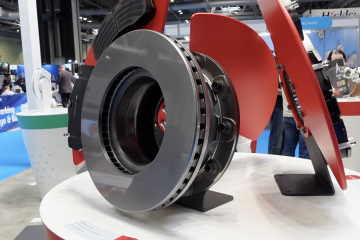The Driver and Vehicle Agency (DVA) in Northern Ireland has announced a consultation over moving the MOT to a biennial schedule.
Currently, the country follows a 4-1-1 schedule, with new cars having their first annual check four-years after registration. However, the DVA wants views around moving the test to a 4-2-2 configuration. The agency also wants to investigate moving the first MOT for light goods vehicles under 3,500kg from three years after registration to four years.
The consultation was launched by Infrastructure Minister Nichola Mallon, and invites those with an interest to provide evidence that could help to shape the future of vehicle testing in the country. The Minister is keen to hear from individuals, groups, organisations, the automotive industry (particularly those involved in MOT preparation) and those with a specific interest in road safety or the environment.
“I have previously stated my intention to look into this issue,” stated Mallon. “As we move towards recovery from the COVID-19 pandemic, I believe that now is the right time to ask the public and those with a direct interest in MOT testing, road safety and environmental protection and others for their views on the potential introduction of testing every two years for some vehicle categories.
“I realise there will be those who favour a change in the frequency of MOT testing and others opposed to any change to the current process. Therefore, I would encourage everyone with an interest to respond to this call and clearly put forward their views with supporting evidence where possible. I want to hear your views.
“Road safety remains a priority for me, and I would like to remind drivers and riders that regardless of the frequency of MOT testing, the statutory responsibility to ensure that a vehicle is roadworthy rests with the owner at all times.”
Industry response
The automotive aftermarket has been battling government attempts to change the frequency of the MOT for some time. The UK parliament has debated on changing to a 3-2-2 system or a 4-1-1, however industry has prevailed, and the 3-1-1 system remains in place.
Northern Ireland has its own agency regulating the MOT, but the threat remains real. Should biennial testing be introduced there, it could be seen as a test for the UK to follow suit. This is alongside the obvious safety implications of increasing time between tests, with unsafe vehicles remaining unchecked on roads for longer.
The Independent Automotive Aftermarket Federation (IAAF) is set to take an active part in the consultation, arguing that the current test frequency is both safer and more cost effective for motorists.
IAAF is set to take an active part in the consultation by the Northern Ireland Executive on the Call for Evidence on the potential introduction of biennial MOT testing (every two years) for private cars, light goods, vehicles.
The current testing frequency in Northern Ireland is 4-1-1 with the first vehicle test at four years of age and then a test every year after. The IAAF will argue that the current test frequency is both safer and more cost effective for motorists.
In Northern Ireland the Department of Infrastructure’s Driver and Vehicle Agency (DVA) is responsible for conducting the roadworthiness testing, more commonly referred to as the “MOT”, of all vehicles which use our public roads. Unlike in Great Britain, the tests in Northern Ireland are conducted in dedicated MOT centres throughout the province.
In the consultation, the IAAF will warn of the potential dangers of extending the MOT test frequency as it could lead to an increase in road accidents and fatalities. The organisation will also point out that an increase in frequency will mean an increase in repair costs for drivers, insurance premiums and harmful emissions.
“It is more important than ever, following the reduction in Northern Ireland testing due to defective lifts in early 2020 and then the impact from the coronavirus pandemic, that the current testing frequency be upheld if not strengthened,” commented IAAF Chief Executive Mark Field.
“To ensure as safe and cost-effective motoring as possible, motorists are responsible to have their vehicle inspected and serviced regularly. Given the substantial backlog of tests in Northern Ireland, which are only coming back to pre-pandemic levels in September, there are more unsafe vehicles on NI roads than ever before. Test Centres are currently experiencing an increase in failed items as a direct result of the granted extensions. It is vital that the Northern Ireland executive understands the impact that a change in MOT frequency would have on the number of unsafe vehicles on NI roads.”
The consultation is open until 19 October 2021. Responses can be made online at: https://consultations.nidirect.gov.uk/dfi-1/call-for-evidence-biennial-mot-testing(external link opens in a new window / tab). You can also download the Call for Evidence from the Department’s website at: https://www.infrastructure-ni.gov.uk/consultations/call-evidence-biennial-mot-testing, where you will also find details of alternative methods of response.



